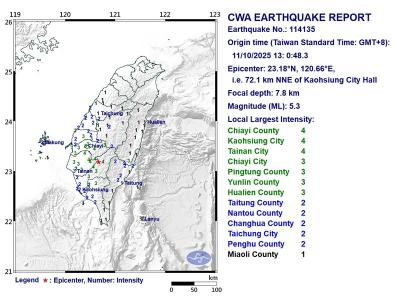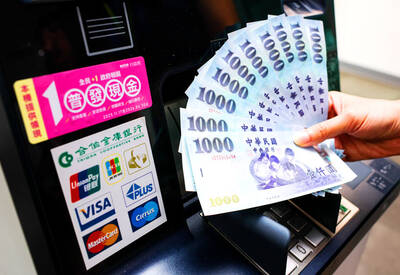US academics yesterday highlighted the role of Taiwan in the White House's foreign policy, saying Taiwan's interests were “not negotiable” in the shaping of US policy on China.
Scott Lilly, a senior fellow at the Center for American Progress, a Washington-based policy research and advocacy organization, told a forum that “the bilateral relationship between the US and Taiwan is one of the most important bilateral relationships in the world.”
That is because “both countries [Taiwan and the US] play critical roles in the biggest issue that is facing the world in this century — and that is the emergence of China,” Lilly said.
To influence China to develop in a direction that is beneficial to its people and the world, Lilly said the US and Taiwan should enhance cultural, economic and diplomatic relations, as well as work together to maintain a military balance in the Taiwan Strait.
“Military balance in the Strait should not move significantly in either direction. Taiwan should not seek and the US should not provide weapons that would do more than preserve the balance,” he said.
Lilly said weapons that are vital to Taiwan should be provided without politics and should be agreed to without being used as bargaining chips to negotiate with China on other issues.
Lawrence Korb, a senior fellow at the center, said the US would not do anything that would undermine the interests of Taiwan as they are “not negotiable.”
Taiwan developing into an information technology hub would contribute to making it indispensable in the world, where soft power and new alliances are becoming increasingly more important than geographic location, said Michael Werz, another senior fellow at the center.
Werz said Taiwan could increase the value of what it contributes to the international system if it could make itself a close, competent and critical research hub about everything that happens in China.
The academics were part of a forum discussing US President Barack Obama's foreign policies organized by the American Cultural Center at the American Institute in Taiwan.
Asked about Taiwan's role in US policy on China, Lilly said it was difficult for the US to think about its relationship with China without thinking about its relationship with Taiwan.
“It's impossible to disentwine US policy in China from US policy in Taiwan. They are of the same parcel,” Lilly said, adding that the US’ relationship with Taiwan was a real test for China in terms of how it moves forward.
Korb said US Secretary of Defense Robert Gates' recent reaffirmation of the US stance on arms sales to Taiwan amid Chinese opposition provided the best answer to the question.
On the imminent signing of a cross-strait economic cooperation framework agreement (ECFA), Sabine Dewan, associate director of international economic policy at the center, said: “It's important to consider the positive and apprehensions that people might have of [an] ECFA and think about where Taiwan would be if this agreement were not brokered.”
“Trade is really one of the ways that we relate to other countries in this transforming global economic landscape. There is no going back. Protectionism is not a possibility anymore,” she said.

The Central Weather Administration (CWA) today issued a sea warning for Typhoon Fung-wong effective from 5:30pm, while local governments canceled school and work for tomorrow. A land warning is expected to be issued tomorrow morning before it is expected to make landfall on Wednesday, the agency said. Taoyuan, and well as Yilan, Hualien and Penghu counties canceled work and school for tomorrow, as well as mountainous district of Taipei and New Taipei City. For updated information on closures, please visit the Directorate-General of Personnel Administration Web site. As of 5pm today, Fung-wong was about 490km south-southwest of Oluanpi (鵝鑾鼻), Taiwan's southernmost point.

Almost a quarter of volunteer soldiers who signed up from 2021 to last year have sought early discharge, the Legislative Yuan’s Budget Center said in a report. The report said that 12,884 of 52,674 people who volunteered in the period had sought an early exit from the military, returning NT$895.96 million (US$28.86 million) to the government. In 2021, there was a 105.34 percent rise in the volunteer recruitment rate, but the number has steadily declined since then, missing recruitment targets, the Chinese-language United Daily News said, citing the report. In 2021, only 521 volunteers dropped out of the military, the report said, citing

A magnitude 5.3 earthquake struck Kaohsiung at 1pm today, the Central Weather Administration said. The epicenter was in Jiasian District (甲仙), 72.1km north-northeast of Kaohsiung City Hall, at a depth of 7.8km, agency data showed. There were no immediate reports of damage. The earthquake's intensity, which gauges the actual effects of a temblor, was highest in Kaohsiung and Tainan, where it measured a 4 on Taiwan's seven-tier intensity scale. It also measured a 3 in parts of Chiayi City, as well as Pingtung, Yunlin and Hualien counties, data showed.

Nearly 5 million people have signed up to receive the government’s NT$10,000 (US$322) universal cash handout since registration opened on Wednesday last week, with deposits expected to begin tomorrow, the Ministry of Finance said yesterday. After a staggered sign-up last week — based on the final digit of the applicant’s national ID or Alien Resident Certificate number — online registration is open to all eligible Taiwanese nationals, foreign permanent residents and spouses of Taiwanese nationals. Banks are expected to start issuing deposits from 6pm today, the ministry said. Those who completed registration by yesterday are expected to receive their NT$10,000 tomorrow, National Treasury